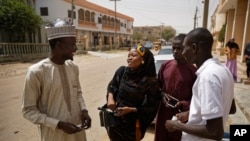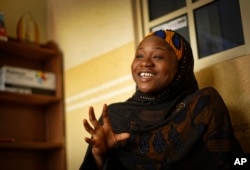Zainab Sulaiman Umar knows how to get out the vote. The Nigerian politician walks door to door, pitching her campaign and touting her party’s platform.
Umar is running for state parliament in Kano, a city in northern Nigeria. She exudes confidence and is optimistic about her odds, and constituents seem receptive to what she’s saying.
“They believe in what I’m doing,” Umar told VOA by phone.
In a country dominated by older male politicians, Umar stands out: She’s a woman, she’s unmarried and she’s just 26 years old. For some Nigerian voters, those are automatic disqualifiers.
“Women should stay at home and do domestic work,” said Bilal Musa, in response to an online survey conducted by VOA’s Hausa service.
“In my own understanding, women shouldn’t participate in politics,” Hussanini-Alhaji Ali, from the Bauchi region, said in the same survey.
‘Women can do it better’
Umar concedes that women don’t actively participate in Nigerian politics, and most people feel women shouldn’t be running for office.
In a country with strict gender roles, men hold 94 percent of parliamentary seats.
But the campaign trail has revealed something else: Attitudes are changing, and people — women and men — are starting to believe that women should have a chance to run for office.
For Umar, who studied communication and finds herself in her first political race, shifting attitudes mean female politicians need confidence to break through. It also means using what some may see as flaws to her advantage.
Umar described an interactive approach to her campaign. Rather than speak to voters from afar, she connects with them on a personal level. “I do my campaign differently from the way others do their campaigns,” she said.
She says she can do things that men and older candidates can’t, like knock on people’s doors and be welcomed in for a face-to-face talk.
Umar’s approach seems to be resonating, particularly with youth and women, who, she feels, can see themselves in her efforts. Men, too, want to see politicians like Umar succeed.
“There is a saying, ‘What a man can do, a woman can do it better.’ The government needs to support women to participate in politics,” said Haruna Yusuf of Daura, the hometown of incumbent President Muhammadu Buhari.
Role of political parties
Even as attitudes shift and more women run for office this election cycle, resistance to female politicians remains strong.
Umar hears putdowns like “she’s not married” and “she’s too young.”
She has a simple retort. “It’s not based on your age. It’s not based on whether you’re married,” she said. “It’s based on your knowledge and wisdom.”
The key, she added, is to respond to naysayers with positive answers.
But systematic changes are also needed. Political parties must do a lot more to bolster women in their ranks, Umar said.
Umar welcomes more young, female politicians. But she urges them to run for office with a purpose, not to make a point.
“They should have an agenda. They should have something they want to do for their country,” Umar said.
The best way to make an impact, she added, is at the local level, where policy changes can happen quickly and constituents can see the effects.
‘They don’t get support’
Looking around her, Umar sees capable women raising families and running households.
She says one or more of them could lead the country — if they’re given a chance.
“Women have always played an important role in politics when they come out to vote,” Shehu Adamu Rijau, a man from Niger state, told VOA. “But when they compete as candidates, they don’t get support.”
In both houses of Nigeria’s National Assembly, women hold only about six percent of the seats, according to the Inter-Parliamentary Union, a group based in Geneva, Switzerland.
The country has never had a female president, and that won’t change this year, after the only female candidate withdrew a few weeks ago.
But long odds don’t discourage Umar. Instead, they push her to try harder. Before long, she envisions a Nigeria with a very different political landscape.
“We are going to have a female president soon in Nigeria,” Umar said.
Daula Saleem with VOA’s Hausa service contributed to this story.





